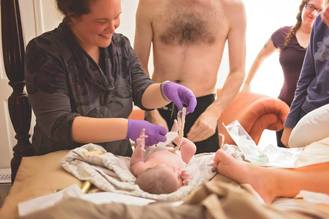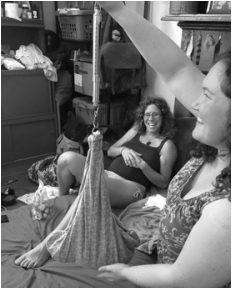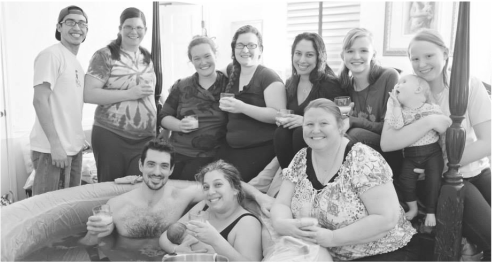Homebirth
|
Homebirth is a return to that which is simple, safe, and intuitive.
It's a chance to bring your child into the world without fear. When you birth at home, we support and guide you as you follow your instincts and bring your baby down and out. We monitor you calmly and, should a complication arise, discuss your options openly with you. Pregnancy and birth are your first acts of parenting this new person. When you take responsibility for your pregnancy and birth, you are well prepared to care for another's life. When you nurture yourself, you practice for nurturing your child. When you build a team you trust, you grow your family within the strength of a community. |
Homebirth Midwifery
|
Assuming the mother and baby are healthy and well, we believe parents can and should have the personalized birth experience they desire. While we naturally have routines around birth, we're open to requests regarding your birth plan, postpartum desires, etc. You may find that many of your requests are our normal routine. We strive to provide high-quality evidence based care in a gentle, spiritually-intact way and most requests can be accommodated within this.
To achieve an empowering birth, women and families must maintain full responsibility for their own health, choices, and for the outcomes of the birth. We support you in this by providing information on nutrition, body movement, childbirth education, doulas, pain management options, and much more, but the woman herself holds the responsibility for making the decisions and maintaining her own health. |
Free Consultation
A free initial visit gives us a chance to meet and discuss whether a homebirth is appropriate. We'll get some background information, answer your questions, and explain our scope of practice. The consultation and all visits last about an hour (except for the first prenatal, which usually runs longer). This gives us plenty of time to answer questions deeply and get to know one another.
Prenatal Care
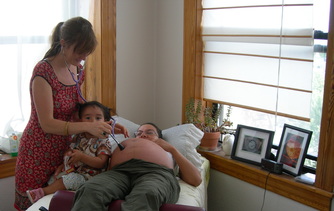
Prenatal visits are scheduled regularly, on a schedule similar to obstetric care.
We screen all women for risk factors when we start care and on an ongoing basis throughout your pregnancy and birth. This includes standard pregnancy lab work and a thorough health history at the first prenatal visit. At each visit, we'll monitor your blood pressure, pulse, weight, uterine growth, fetal size and position, fetal heart rate, and test your urine. We'll also discuss nutrition, pregnancy guidance and birth planning, and address anything that is coming up for you in your pregnancy. Standard labs and tests can often be done in-office, which most women find to be lower stress than a lab or doctor's office. Ultrasounds and more advanced diagnostic tests can be ordered as needed.
At the consultation, we'll provide a packet of information and several agreements for you to read and bring signed to your first prenatal visit.
Louisiana law requires midwifery clients to see an obstetrician once before starting midwifery care and again by 36 weeks. Call if you'd like a recommendation for an OB.
We screen all women for risk factors when we start care and on an ongoing basis throughout your pregnancy and birth. This includes standard pregnancy lab work and a thorough health history at the first prenatal visit. At each visit, we'll monitor your blood pressure, pulse, weight, uterine growth, fetal size and position, fetal heart rate, and test your urine. We'll also discuss nutrition, pregnancy guidance and birth planning, and address anything that is coming up for you in your pregnancy. Standard labs and tests can often be done in-office, which most women find to be lower stress than a lab or doctor's office. Ultrasounds and more advanced diagnostic tests can be ordered as needed.
At the consultation, we'll provide a packet of information and several agreements for you to read and bring signed to your first prenatal visit.
Louisiana law requires midwifery clients to see an obstetrician once before starting midwifery care and again by 36 weeks. Call if you'd like a recommendation for an OB.
Labor and Birth
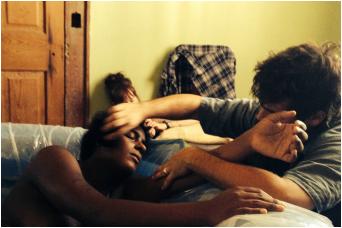
You'll let us know when labor starts. We'll talk about priorities in early labor and make a plan together. Then, once you're in active labor (generally considered around 6 cm dilation if it's your first vaginal birth or 4 cm if you've had a vaginal birth before), we will come to your home and stay with you until your baby is born and everyone is stable and well. While you labor, we'll set up supplies and equipment and monitor you and your baby as unobtrusively as we can. We encourage you and your partner to labor on your own as much as possible; birth proceeds best when you listen your body and aren't interfered with by antsy providers. We'll monitor your vital signs, labor progress, fetal heart rate and position, and help you stay calm, active, fed, and hydrated. When there are no complications, our main role as your midwife is to help you create a birthing space where you feel safe, calm, and supported.
As you labor on and the birth draws closer, we'll provide perineal support, guide you through pushing if needed or requested, assist in the birth of the baby, monitor you and your baby in those first moments postpartum ("third stage"), and help you birth your placenta. Your baby will stay with you the entire time, as there is rarely a good reason to separate the motherbaby duo in those first days.
As you labor on and the birth draws closer, we'll provide perineal support, guide you through pushing if needed or requested, assist in the birth of the baby, monitor you and your baby in those first moments postpartum ("third stage"), and help you birth your placenta. Your baby will stay with you the entire time, as there is rarely a good reason to separate the motherbaby duo in those first days.
Immediate Postpartum Care
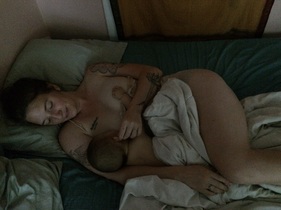
We stay at least 3 hours after the birth, checking that you and your baby are stable and well before we leave. We provide instructions and guidance on caring for the new mother and baby and let you know when to call.
We examine the placenta for completeness and will show it to you or leave it for you if you'd like. When you're ready, we provide a gentle and thorough newborn exam that we can do on the bed next to you. We'll monitor your uterine tone, bleeding, and vital signs and support your breastfeeding. We'll monitor the baby's breathing, heart rate, temperature, activity level, breastfeeding, and overall wellness. At a homebirth, women often have intact perineums or only minor tears that can easily be sutured at home. We provide oral or intramuscular Vitamin K and erythromycin eye ointment if desired. Once you and your baby are stable, have eaten, and are tucked into bed, we'll clean and pack up everything and be on our way.
We know what's normal and can recognize complications in the mother and baby. Most complications can be resolved at home under midwifery care. In the rare situation where a true emergency arises, we are trained to keep the mother and baby stable until we can transfer to a hospital. We carry oxygen, neonatal resuscitation and suction equipment, anti-hemorrhagic drugs, IV supplies for fluid replacement, and a full set of sterile suturing equipment.
We examine the placenta for completeness and will show it to you or leave it for you if you'd like. When you're ready, we provide a gentle and thorough newborn exam that we can do on the bed next to you. We'll monitor your uterine tone, bleeding, and vital signs and support your breastfeeding. We'll monitor the baby's breathing, heart rate, temperature, activity level, breastfeeding, and overall wellness. At a homebirth, women often have intact perineums or only minor tears that can easily be sutured at home. We provide oral or intramuscular Vitamin K and erythromycin eye ointment if desired. Once you and your baby are stable, have eaten, and are tucked into bed, we'll clean and pack up everything and be on our way.
We know what's normal and can recognize complications in the mother and baby. Most complications can be resolved at home under midwifery care. In the rare situation where a true emergency arises, we are trained to keep the mother and baby stable until we can transfer to a hospital. We carry oxygen, neonatal resuscitation and suction equipment, anti-hemorrhagic drugs, IV supplies for fluid replacement, and a full set of sterile suturing equipment.
Ongoing Postpartum Care
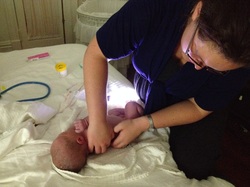
Midwifery postpartum care couldn't be more different from its hospital-based counterpart. We see you frequently: in your home on days 1, 3, and 7 and in the office at 2-3 weeks and 6 weeks. We monitor you for physical and emotional recovery and discuss ways to help you heal quickly and completely. We review the birth with you and help you integrate your experience, which often provided unexpected challenges. We also monitor your baby's weight change, breastfeeding, sleeping habits, urine and bowel movements, jaundice, and any concerns you have.
We file for your baby's birth certificate and social security number and can provide the Newborn Metabolic Screen ("PKU test") at home. At the last postpartum, we discuss contraception needs and help you choose a method that works for you.
We file for your baby's birth certificate and social security number and can provide the Newborn Metabolic Screen ("PKU test") at home. At the last postpartum, we discuss contraception needs and help you choose a method that works for you.
Availability
We are available by phone, text, and email during normal business hours for questions and support. For urgent situations or labor calls, of course, call anytime day or night. For non-urgent questions or needs, we prefer email to texting.
Fees & Expenses
The full fee is $4700. Payment plans and certain discounts are available to women in need.
Includes:
Not Included:
- Approximately 12 one-on-one prenatal visits
- Availability by phone, text, and email throughout your pregnancy and the postpartum period
- Frequent nutrition counseling: general guidelines for pregnancy and also suggestions for your personal needs
- Referrals, as appropriate
- On call services from 37 weeks of pregnancy to birth
- Once we're on call, we stay within a 2 hour range from your home
- Birth tub rental, standard faucet adaptor, sump pump to drain tub, and use of air pump if needed
- Labor and birth support and monitoring
- Thorough newborn assessment and exam
- Management and care through the immediate postpartum period, lasting at least 3 hours after birth
- Postpartum visits in your home for the first week: days 1, 3, and 7
- In-office postpartum visits at 2 weeks and 6 weeks postpartum, and more if needed
- Support establishing breastfeeding and in the postpartum transition
- Calm reassurance and a positive outlook
- Dedicated Second Midwife: another fully qualified Licensed Midwife available for you if your primary midwife is ill, at another birth, etc.
Not Included:
- Standard birth kit
- Basic household supplies needed for the birth (towels, etc.). We will provide a list of required items.
- Fees charged by other providers (OB, chiropractor, pediatrician, etc.)
- Labs, ultrasounds, and diagnostic tests. These are usually covered by private insurance or Medicaid.
- Herbs, vitamins, and supplements
- We'll provide a full list of included and excluded items at the consult visit.

